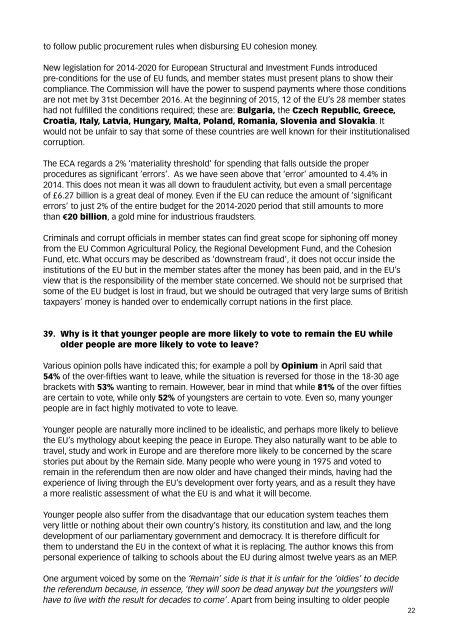EU Referendum FAQ v4
For those undecided in which way to vote in the EU referendum,this addresses the main questions and concerns people have
For those undecided in which way to vote in the EU referendum,this addresses the main questions and concerns people have
Create successful ePaper yourself
Turn your PDF publications into a flip-book with our unique Google optimized e-Paper software.
to follow public procurement rules when disbursing <strong>EU</strong> cohesion money.<br />
New legislation for 2014-2020 for European Structural and Investment Funds introduced<br />
pre-conditions for the use of <strong>EU</strong> funds, and member states must present plans to show their<br />
compliance. The Commission will have the power to suspend payments where those conditions<br />
are not met by 31st December 2016. At the beginning of 2015, 12 of the <strong>EU</strong>’s 28 member states<br />
had not fulfilled the conditions required; these are: Bulgaria, the Czech Republic, Greece,<br />
Croatia, Italy, Latvia, Hungary, Malta, Poland, Romania, Slovenia and Slovakia. It<br />
would not be unfair to say that some of these countries are well known for their institutionalised<br />
corruption.<br />
The ECA regards a 2% ‘materiality threshold’ for spending that falls outside the proper<br />
procedures as significant ‘errors’. As we have seen above that ‘error’ amounted to 4.4% in<br />
2014. This does not mean it was all down to fraudulent activity, but even a small percentage<br />
of £6.27 billion is a great deal of money. Even if the <strong>EU</strong> can reduce the amount of ‘significant<br />
errors’ to just 2% of the entire budget for the 2014-2020 period that still amounts to more<br />
than €20 billion, a gold mine for industrious fraudsters.<br />
Criminals and corrupt officials in member states can find great scope for siphoning off money<br />
from the <strong>EU</strong> Common Agricultural Policy, the Regional Development Fund, and the Cohesion<br />
Fund, etc. What occurs may be described as ‘downstream fraud’, it does not occur inside the<br />
institutions of the <strong>EU</strong> but in the member states after the money has been paid, and in the <strong>EU</strong>’s<br />
view that is the responsibility of the member state concerned. We should not be surprised that<br />
some of the <strong>EU</strong> budget is lost in fraud, but we should be outraged that very large sums of British<br />
taxpayers’ money is handed over to endemically corrupt nations in the first place.<br />
39. Why is it that younger people are more likely to vote to remain the <strong>EU</strong> while<br />
older people are more likely to vote to leave?<br />
Various opinion polls have indicated this; for example a poll by Opinium in April said that<br />
54% of the over-fifties want to leave, while the situation is reversed for those in the 18-30 age<br />
brackets with 53% wanting to remain. However, bear in mind that while 81% of the over fifties<br />
are certain to vote, while only 52% of youngsters are certain to vote. Even so, many younger<br />
people are in fact highly motivated to vote to leave.<br />
Younger people are naturally more inclined to be idealistic, and perhaps more likely to believe<br />
the <strong>EU</strong>’s mythology about keeping the peace in Europe. They also naturally want to be able to<br />
travel, study and work in Europe and are therefore more likely to be concerned by the scare<br />
stories put about by the Remain side. Many people who were young in 1975 and voted to<br />
remain in the referendum then are now older and have changed their minds, having had the<br />
experience of living through the <strong>EU</strong>’s development over forty years, and as a result they have<br />
a more realistic assessment of what the <strong>EU</strong> is and what it will become.<br />
Younger people also suffer from the disadvantage that our education system teaches them<br />
very little or nothing about their own country’s history, its constitution and law, and the long<br />
development of our parliamentary government and democracy. It is therefore difficult for<br />
them to understand the <strong>EU</strong> in the context of what it is replacing. The author knows this from<br />
personal experience of talking to schools about the <strong>EU</strong> during almost twelve years as an MEP.<br />
One argument voiced by some on the ‘Remain’ side is that it is unfair for the ‘oldies’ to decide<br />
the referendum because, in essence, ‘they will soon be dead anyway but the youngsters will<br />
have to live with the result for decades to come’. Apart from being insulting to older people<br />
22







